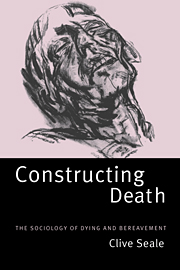Introduction
Published online by Cambridge University Press: 28 October 2009
Summary
The argument of this book is that social and cultural life involves turning away from the inevitability of death, which is contained in the fact of our embodiment, and towards life. This chapter provides an overview and summary of the key themes of the book, which explores the implications of this view. Study of the human experience of death allows us to understand some fundamental features of social life. Embodiment dictates basic parameters for the construction of culture, the key problem for which is contained in the fact that bodies eventually die. On the one hand this threatens to make life meaningless, but on the other it is a basic motivation for social and cultural activity, which involves a continual defence against death. Through a variety of practices, both routine and extraordinary, the threat to basic security about being in the world posed by knowledge of mortality, is transformed in human social activity into an orientation towards continuing, meaningful existence. At the same time the cultural forms made available to members of different societies to overcome the problem of death vary greatly. An understanding of cultural variation helps us perceive the degree to which our own constructions of death, dying and bereavement as well as broader issues concerning the formation of selfidentity are in fact specific to the conditions of late modernity and, indeed, are dominated by the conceptions of particular social groups.
- Type
- Chapter
- Information
- Constructing DeathThe Sociology of Dying and Bereavement, pp. 1 - 8Publisher: Cambridge University PressPrint publication year: 1998
- 4
- Cited by

